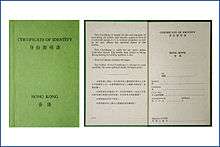Hong Kong Certificate of Identity

The Hong Kong Certificate of Identity (CI; Chinese: 香港身份證明書) was a formal travel document and passport, issued by the Hong Kong Government's Immigration Department until June 30, 1997 (See transfer of the sovereignty of Hong Kong). It is no longer possible to possess a valid CI as a travel document, as all CIs have expired by 30 June 2007, though most CI holders should be eligible to hold the HKSAR Passport.
Eligibility
Certificates of Identity were issued to Hong Kong permanent residents who did not hold and could not obtain any valid travel documents for overseas travel. Normally, CIs were valid for ten years.
Since establishment of the HKSAR on 1 July 1997, no more Certificates of Identity were issued. Those already issued remained valid for travel until expiry (which may pass beyond 30 June 1997; as CIs were valid for a maximum of 10 years), none of which past 30 June 2007.
CI were not used to enter Mainland China or Macau.
CI and PRC citizenship
Most (but not all) former CI holders were solely People's Republic of China (PRC) citizens. Many of them were immigrants from mainland China who had acquired the right of abode in Hong Kong. They did not co-hold any type of British nationality (See British nationality law and Hong Kong for details pertaining to various kinds of British nationalities). Before the handover, they were not eligible for any kinds of PRC passports. The PRC only issued Home Return Permit for them to enter mainland China only. If they did not choose to acquire British nationality through naturalisation, they could apply for the CI as a travel document from the colonial Hong Kong Government.
After the handover, all Hong Kong permanent residents with PRC Citizenship are eligible to apply for a Hong Kong SAR passport.
Endorsements on CIs
On July 1, 1987, the concept of "right of abode" was introduced in Hong Kong legislation. A modified Hong Kong Certificate of Identity was introduced to ensure that Certificates of Identity would be acceptable for the purpose of international travel both before and after the handover of Hong Kong. These documents contain an endorsement showing that “the holder has the right of abode in Hong Kong”.
To ensure Certificate of Identity will be acceptable for the purpose of international travel and for the return to HK after 30 June 1997, the British and the Chinese Government have agreed that the Certificate of Identity contain the following endorsement:
| “ | The holder of this passport has Hong Kong permanent identity card number xxxx which states that the holder has the right of abode in Hong Kong. | ” |
Acceptance and visa-free access
Countries that allowed Hong Kong Certificate of Identity holders to visit without visas:
- South Korea : 30 days
- Palau : no specific limit of stay (subject to final decision made by immigration officer, on individual merit)
- Netherlands Antilles / Aruba : 14 days
- Northern Mariana Islands : 1 month
- Singapore : 30 days
After the HKSAR was established, a number of countries have ceased to accept CI's at different times. Those not yet eligible for HKSAR passports would recourse to the Document of Identity.
However it is no longer possible to possess a valid CI as a travel document, because all CIs have expired by 30 June 2007.
Notes contained in the Certificate of Identity
The following statements were printed in both English and traditional Chinese.
Front cover
"The present Certificate is issued for the sole purpose of providing the holder with identity papers in lieu of a national passport. It is without prejudice to and in no way affects the national status of the holder. If the holder obtains a national passport this Certificate ceases to be valid and must be surrendered to the issuing authority or nearest British Consulate, High Commission or Passport Office for cancellation and return to the Holder."
Back cover
1. This Certificate of Identity remains property of the Hong Kong government. It will normally be cancelled if the holder obtains a national passport or other travel document.
2. Certificates of identity are normally valid for ten years from date of issue, but may be made valid for shorter periods in certain circumstances.
3. The holder may return to Hong Kong without visa, provided the Certificate is valid.
4. The holder is advised to obtain visas for any country he wishes to visit or pass through.
5. Should the holder take up residence in a country or territory outside Hong Kong application should be made to the competent authorities of this country of residence for a new travel document.
6. The issue of this certificate does not confer a right on the holder to the protection of British diplomatic or consular representatives abroad, nor does it exempt the holder from the provisions of the Hong Kong Immigration Ordinance Chapter 115.
7. The Certificate is a valuable document and should not be altered in any way or allowed to pass into the possession of an unauthorised person. If lost or destroyed, a report should immediately be made to the issuing office or to the nearest British Consulate, High Commission or Police Office, as well as to the local police.
These notes apply to the following version of the Certificate of Identity: I.D. 67 (Revised) in 1980.
Other forms of documents used in Hong Kong
- British National (Overseas) passport
- British Dependent Territories Citizen passport
- Hong Kong SAR passport
- Document of Identity
- Hong Kong Re-entry Permit
- Other passports of other countries
See also
External links
| ||||||||||||||||||